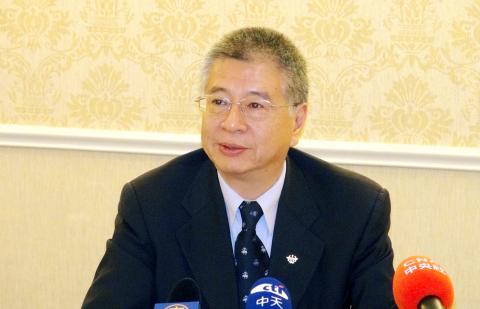Taiwan is developing “asymmetrical strategies” utilizing unconventional capabilities to counter China’s military buildup, Deputy Minister of National Defense Andrew Yang (楊念祖) said at a conference in Richmond, Virginia, on Monday.
In a keynote speech at this year’s US-Taiwan Defense Industry Conference, Yang addressed an emerging China’s impact on Asia-Pacific security, Taiwan’s response and the objectives Taiwan and the US could work on together to maintain peace and stability in the Taiwan Strait.
He described Taiwan’s asymmetrical mindset as one of “David against Goliath” to deal with the growing military imbalance across the Taiwan Strait.

Photo: CNA
“In combination with innovative weapons and defensive countermeasure weapons, Taiwan integrates conventional and unconventional warfare flexibility to create cost-efficient, highly efficient and attainable ‘asymmetric/innovative’ powers,” Yang said.
That way, Taiwan can maximize its advantages to hit the most vulnerable parts of the enemy, sabotage the enemy’s operations and gain mobility, he said.
“This is exactly how size does not matter,” he said.
Yang also stressed that Taiwan cannot produce weapons indigenously for technological or cost reasons and has to buy them from other countries.
“Everything we want to buy is defensive because we need to replace our outdated weapons with new ones, instead of engaging in an arms race,” Yang said.
On reports that the US has decided to offer Taiwan an upgrade to its F-16A/B fleet, but not the more advanced F-16C/D aircraft that Taipei had hoped to acquire, Yang reaffirmed that Taiwan needs the more advanced fighters to replace the air force’s aging F-5E/Fs.
The advanced jet fighters and diesel-electric submarines that Taiwan has also requested both have a direct impact on peace and stability in the Taiwan Strait, Yang said.
He also pledged that Taiwan would never provoke hostilities or launch a first strike, but said that it needed to protect itself and take countermeasures if it came under attack.
Taiwan had to have the ability to survive a first strike, to counter decapitation strikes, initiate mobile counterstrikes and survive prolonged operations, he said.
If an enemy initiated an attack, Taiwan would have to draw on its advantages by employing its defensive countermeasure capabilities to hit key military targets and amphibious troops assembling at ports, he said.
As a battle progressed, Taiwan would place more emphasis on joint interdiction and joint anchorage attacks to stop the enemy from traveling across the Taiwan Strait and delay their arrival in Taiwan, he said.
Also speaking at the conference, Joseph Wu (吳釗燮), a former representative to the US under the previous Democratic Progressive Party administration, said if the US rejected the sale of F-16C/Ds because of pressure from China, it would be even harder for it to sell more sensitive weapons to Taiwan.
Wu, who said the US had been lukewarm to selling new fighters to Taiwan in the past, said it was not a good thing for the F-16C/Ds to become the focus of the international community, because Taiwan’s needs for equipment related to naval and joint warfare operations could be affected.
He said if the US felt caught between Chinese pressure and its obligations under the Taiwan Relations Act, it could provide technological assistance to help Taiwan produce defensive weapons, such as smaller submarines, and build a self-sufficient defense industry.

An essay competition jointly organized by a local writing society and a publisher affiliated with the Chinese Communist Party (CCP) might have contravened the Act Governing Relations Between the People of the Taiwan Area and the Mainland Area (臺灣地區與大陸地區人民關係條例), the Mainland Affairs Council (MAC) said on Thursday. “In this case, the partner organization is clearly an agency under the CCP’s Fujian Provincial Committee,” MAC Deputy Minister and spokesperson Liang Wen-chieh (梁文傑) said at a news briefing in Taipei. “It also involves bringing Taiwanese students to China with all-expenses-paid arrangements to attend award ceremonies and camps,” Liang said. Those two “characteristics” are typically sufficient

A magnitude 5.9 earthquake that struck about 33km off the coast of Hualien City was the "main shock" in a series of quakes in the area, with aftershocks expected over the next three days, the Central Weather Administration (CWA) said yesterday. Prior to the magnitude 5.9 quake shaking most of Taiwan at 6:53pm yesterday, six other earthquakes stronger than a magnitude of 4, starting with a magnitude 5.5 quake at 6:09pm, occurred in the area. CWA Seismological Center Director Wu Chien-fu (吳健富) confirmed that the quakes were all part of the same series and that the magnitude 5.5 temblor was

The brilliant blue waters, thick foliage and bucolic atmosphere on this seemingly idyllic archipelago deep in the Pacific Ocean belie the key role it now plays in a titanic geopolitical struggle. Palau is again on the front line as China, and the US and its allies prepare their forces in an intensifying contest for control over the Asia-Pacific region. The democratic nation of just 17,000 people hosts US-controlled airstrips and soon-to-be-completed radar installations that the US military describes as “critical” to monitoring vast swathes of water and airspace. It is also a key piece of the second island chain, a string of

The Central Weather Administration has issued a heat alert for southeastern Taiwan, warning of temperatures as high as 36°C today, while alerting some coastal areas of strong winds later in the day. Kaohsiung’s Neimen District (內門) and Pingtung County’s Neipu Township (內埔) are under an orange heat alert, which warns of temperatures as high as 36°C for three consecutive days, the CWA said, citing southwest winds. The heat would also extend to Tainan’s Nansi (楠西) and Yujing (玉井) districts, as well as Pingtung’s Gaoshu (高樹), Yanpu (鹽埔) and Majia (瑪家) townships, it said, forecasting highs of up to 36°C in those areas